
Lying among the sombre browns and dull burgundies of the best-sellers table, Asako Yuzuki’s Butter gleamed — a perfect, golden slab of yellow, thick and smooth, as if someone had left a pat of butter to soften under the warm store lights. I felt that, if I were to press my thumb against the glossy cover, it would yield, leaving a smudge of richness behind.

Of course, one should never judge a book by its cover, as the old adage goes. Yet I am glad that I did in this case, for Butter is a wondrous book — a moreish and slightly indulgent meditation on misogyny, fatphobia and appetite in modern Japan.
Inspired by the real-life case of Kanae Kijima — the "Konkatsu Killer" — Butter follows Rika Machida, a hardworking journalist in her early 30s who is so committed to her career that she has neglected other relationships in her life — with food, her mother, her boyfriend and her friends.
When she lands the scoop of a lifetime and begins to interview Manako Kajii (Kajimana), a convicted serial killer with a deep passion for cooking, Rika is drawn into an increasingly unsettling and intimate dynamic.
Kajii has been accused of seducing, manipulating, and then murdering a series of rather pathetic men, but these transgressions pale in comparison to that of her greatest crime — her unapologetic love of fine food. Kajimana devours life.
She likes her meals rich with butter (never margarine), and she eats without pleasure or shame, caring not for her own plumpness nor for the public’s censure.
Kajimana chews up and spits out the idea that women should restrain themselves, consume cautiously, and even starve themselves while feeding and nurturing the men around them. Over the course of her interviews with Kajimana, Rika’s appetite for rich food balloons, as does her weight.
As she swells, Rika becomes increasingly aware of society’s double standards when it comes to men and women’s appearances.
"Men putting on weight is different from women putting on weight," her boyfriend Makado argues.

I grew up in a fundamentalist Christian household where femininity meant self-denial — modesty in dress, quietness in speech, discipline in body. My appetite was something to be conquered, controlled, erased even.
Butter also critiques the way Japanese women’s emotional and domestic labour is expected to serve men, often at great personal cost. Women are tasked with loving and nourishing the men around them, while simultaneously denying themselves anything beyond the bare bones required for daily sustenance.
"The kind of wife that the men on those sites are looking for is, at base, a woman with no sense of life about her," Rika realises.
"Their ideal partner would be a kind of ghost."
At one point, Rika’s friend Reiko notes with unsettling clarity that the average Japanese woman now consumes fewer daily calories than those living in the famine years of post-World War 2 Japan.
In Butter, food is never just food. It is transformative, orgasmic ("when I’m eating good butter I feel somehow as though I were falling").
It is rebellion, seduction, even a vehicle for violence.

"Milk was originally blood," Rika remarks, thinking of a children’s fairytale about ravenous tigers turning into creamy butter.
Good food is commensurate with love, friendship and the intimate bonds between women. Dieting, therefore, is self-isolation and self-harm.
Butter is a slow burn, luxuriating in vivid sensory descriptions and delectable food imagery. At times it is a little repetitive — there is too much sweat and slicked lips — although never too much butter or soy sauce.
Some of the character’s decisions are incongruously ill thought out and patently ridiculous, such as when Reiko sets off on a fool-hardy mission to find the man Kaji was staying with prior to her arrest. There is some disconnect between Butter’s real ingredients and the way it was marketed; Butter is less a thriller and more a gentle disarticulation of women’s relationships and their place in society.
Butter may not be the perfect novel, but it certainly made me re-evaluate my relationships with food, my female friends and the curves of my body. It forced me to confront my own struggles with appetite, control and shame.
Butter left me questioning why I have spent so many years trying to shrink myself, to render myself delicate and palatable for the men around me. Unlike Kajimana, I have no desire to leech off (and then murder) lonely and vulnerable men. But like Kajii, I too want to take up space.
I am hungry for more. Itadakimasu.
— Jean Balchin is an ODT columnist who has started a new life in Edinburgh.













